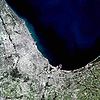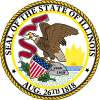Ringwood, Illinois
Ringwood | |
|---|---|
| Etymology: A ring of woods | |
| Motto(s): Where the Past meets the Future | |
 Location of Ringwood in McHenry County, Illinois. | |
 Location of Illinois in the United States | |
| Coordinates: 42°23′42″N 88°18′11″W / 42.39500°N 88.30306°WCoordinates: 42°23′42″N 88°18′11″W / 42.39500°N 88.30306°W | |
| Country | United States |
| State | Illinois |
| County | McHenry |
| Founded | 15 November 1994 |
| Government | |
| • Deputy Mayor | Kevin Bauer |
| • Village president | Rick Mack |
| Area | |
| • Total | 3.88 sq mi (10.04 km2) |
| • Land | 3.88 sq mi (10.04 km2) |
| • Water | 0.00 sq mi (0.00 km2) |
| Population (2010) | |
| • Total | 836 |
| • Estimate (2019)[2] | 813 |
| • Density | 209.64/sq mi (80.95/km2) |
| Time zone | UTC-6 (CST) |
| • Summer (DST) | UTC-5 (CDT) |
| ZIP Code(s) | 60072 |
| Area code(s) | 815 |
| FIPS code | 17-64135 |
| Wikimedia Commons | Ringwood, Illinois |
| Website | ringwood-il |
Ringwood is a northwest suburban village in McHenry County, Illinois, United States. It is a commuter village, part of the Chicago metropolitan area. The population was 836 at the 2010 census.
History[]
Settlement[]
Ringwood was settled in 1837 by Dr. Luke Hale and Wm. H. Beach, both native to Vermont. The original settlement was supposedly surrounded by a ring of trees, hence the name 'Ringwood'.[3]
Development[]
The Ringwood post office was established in 1845 to provide post office boxes for local industrial firms and residents located on the far northern edge of McHenry. The small village was platted in 1854, allowing the installation of roads, infrastructure, public amenities and allowing residents to legally own plots of land for agricultural use, and the construction of homes and businesses. In an attempt to maintain its small-town environment[citation needed], Ringwood was incorporated as a Village on the 15 November 1994. By 2018, the Village of Ringwood had two paid staff, plus contracted services including building inspection, and an unsalaried Board of Trustees.[4]
Geography[]
Ringwood is located at 42°23′42″N 88°18′11″W / 42.39500°N 88.30306°W (42.395084, -88.303030),[5] and is adjacent to the larger Village of Johnsburg, to the southeast.
According to the 2010 census, Ringwood has a total area of 3.86 square miles (10.00 km2), all land.[6]
Major streets[]
 Richmond Road
Richmond Road- Barnard Mill Road
- Ringwood Road
Public and rail transportation[]
As of October 2018, the closest public transportation to Ringwood is a Pace bus route that runs through Johnsburg, between the nearby municipalities of Crystal Lake, McHenry, and Fox Lake. The closest rail transit is the McHenry commuter rail station, one of the termini of Metra's Union Pacific/Northwest Line. Until 1980, the commuter rail service also served a Ringwood station and continued north to the Village of Richmond, Illinois.[7][8] A remaining freight track exists between Ringwood's Dow Chemical plant at Barnard Mill Road and McHenry station.[9]
Demographics[]
| Historical population | |||
|---|---|---|---|
| Census | Pop. | %± | |
| 2000 | 471 | — | |
| 2010 | 836 | 77.5% | |
| 2019 (est.) | 813 | [2] | −2.8% |
| U.S. Decennial Census[10] | |||
As of the census of 2010,[11] there were 836 people. The population density was 216.6 people per square mile (83.6/km2). There were 297 housing units at an average density of 76.9 per square mile (29.7/km2). The racial makeup of the village was 96.2% White, 0.8% African American, 0.2% Asian, 0.6% from other races, and 2.2% from two or more races. Hispanic or Latino of any race were 3% of the population.[11]
In the village, the population was spread out, with 26.9% (225) under the age of 18, 73.0% (611) over the age of 18, 3.2% (27) from 20 to 24, 5.5% (46) from 25 to 34, 27.6% (231) from 35 to 49, 23.3% (195) from 50 to 64, and 10.2% (85) were aged 65 or more. The median age was 42.4 years of age. 50.1% (419) were male, and 49.9 (417) were female.
There were 285 households, out of which 36.1% had children under the age of 18 living with them, 73.3% were married couples living together, 6.3% had a female householder with no husband present, 3.2% had a male householder with no wife present, and 17.2% were non-families. 13.7% of all households were made up of individuals, and 3.5% had someone living alone who was 65 years of age or older. The average household size was 2.93 and the average family size was 3.22.[12] The median income for a household in the village was $90,250, and the median income for a family was $91,389. Males had a median income of $91,250 versus $37,500 for females. The per capita income for the village was $35,151. About 9.4% of families and 8.8% of the population were below the poverty line, including 15.0% of those under age 18 and 6.7% of those age 65 or over.[13]
References[]
- ^ "2019 U.S. Gazetteer Files". United States Census Bureau. Retrieved July 14, 2020.
- ^ Jump up to: a b "Population and Housing Unit Estimates". United States Census Bureau. May 24, 2020. Retrieved May 27, 2020.
- ^ Chicago and North Western Railway Company (1908). A History of the Origin of the Place Names Connected with the Chicago & North Western and Chicago, St. Paul, Minneapolis & Omaha Railways. p. 118.
- ^ "About Ringwood Illinois". Village of Ringwood. 2018. Retrieved 2019-01-21.
- ^ "US Gazetteer files: 2010, 2000, and 1990". United States Census Bureau. 2011-02-12. Retrieved 2011-04-23.
- ^ "G001 - Geographic Identifiers - 2010 Census Summary File 1". United States Census Bureau. Archived from the original on 2020-02-13. Retrieved 2015-12-25.
- ^ "System Map" (PDF). Regional Transportation Authority (Illinois). October 2018. Retrieved 2019-01-21.
- ^ Villaire, Ted (2010-06-01). Best Rail Trails Illinois: More than 40 Rail Trails throughout the State. Rowman & Littlefield. ISBN 9780762762897.
- ^ "Dow Chemical [Ringwood]". Buzzfile. Retrieved 2019-01-21.
- ^ "Census of Population and Housing". Census.gov. Retrieved June 4, 2015.
- ^ Jump up to: a b "2010 Census Interactive Population Map". United States Census Bureau. Archived from the original on 13 October 2013. Retrieved 23 November 2012.
- ^ "Profile of General Population and Housing Characteristics: 2010". United States Census Bureau. Archived from the original on 21 May 2019. Retrieved 23 November 2012.
- ^ "Selected Economic Characteristics". United States Census Bureau. Archived from the original on 12 February 2020. Retrieved 23 November 2012.
External links[]
- Villages in McHenry County, Illinois
- Villages in Illinois
- Chicago metropolitan area
- Populated places established in 1837


